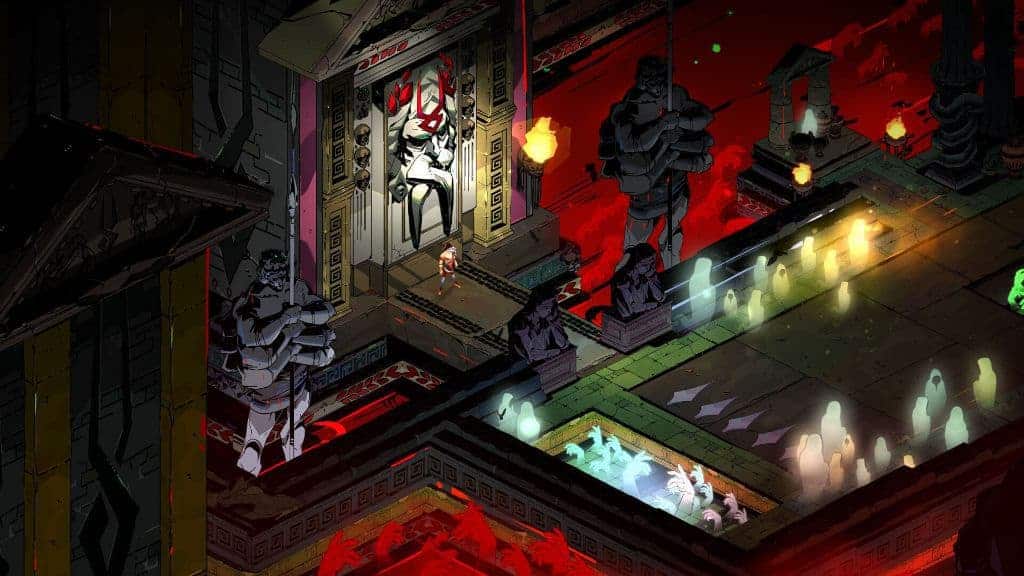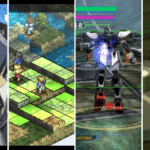Die, die and die again, A look at Supergiant’s latest hack n’ slash adventure.
Entering early access in 2018, the now fully released Hack and Slash ‘Hades’ by Supergiant Games has reignited a love for the roguelike genre. Releasing fully in September of 2020, the game is still delivering me content run after run 2 months from picking it up for the Nintendo switch.

Gameplay
Despite its name, the game follows Zagreus – the outwardly edgy but otherwise friendly prince of the underworld and son of Hades. Disillusioned with the bureaucracy and darkness, Zagreus is determined to push the underworld’s unbreakable reputation to its limits.
Flow of the underworld
Each run, called an escape attempt in game, begins in the House of Hades. Here you interact with NPC’s, upgrade your character (and eventually the underworld itself) and select your weapon before embarking into Tartarus.
As you travel through the games 4 regions, each ending with a difficult boss battle, various divine boons from Olympus or hammers from the mighty Daedalus will litter the path. These are what give you power, amplifying your various abilities or weapon in unique ways. Each run is about finding synergy between all these abilities to create some truly exciting builds.
You also find several other resources, such as gemstones, darkness essence or keys, which are all maintained after your encroaching demise. These are used back in the House of Hades to unlock more new things or even learn more about the games diverse cast.
Then you pick a weapon and get ready to go again, back into the depths.
Die, die, and die again
The reason the game remains so engaging to me still is the options you have. With 6 weapons, all with 4 unique forms, plus a wide range of skills, modifiers and other things that effect your run – there is a lot of refreshing and interesting choices. As a rogue-lite, every run you get a little better. The resources you find mind upgrade a weapons aspect, grab a new skill, or develop your relationship with its wide cast of NPCs.
The game isn’t stagnant either. As you progress; Bosses can gain alternate forms, silly nicknames affectionally given by Zagreus or even alterations to their arenas. Sometimes minor things that just keep everything refreshing.
Every run so far feels like progress, I’m always getting a resource or some new dialogue to keep me motivated with each epic run through the beautiful but deadly underworld. Every action has a reward in some capacity.

Narrative
There isn’t just gameplay benefits to every attempt. The story and narrative is way ahead of most other titles in the roguelike genre. Every visit to the House of Hades, where you return upon death, is met with NPC’s in new places, new dialogue and interesting perspectives. Its extremely reactive to your actions as well – with certain characters missing for a day or two after encountering them out in the underworld.
Consistent progression
Even within a run the narrative flows. As you play, you earn boons from your various family members up in Olympus. While you cannot really talk back, each offers interesting commentary about the world and their personalities. There are even Duo skills where two will interact with one another to keep things refreshing. They help progress the story in their own way.
The player character as well, Zagreus, is also surprisingly likable. While angry at being stuck in the underworld for eternity and owning his edgy appearance, there is plenty of compassion and development there. Despite being so characterised that it doesn’t work as a self insert, it’s still a compelling character.
Plenty of perspectives
The bosses you face in each run are just as packed with personality. Each has new thoughts, feelings, and comments as you come again and again, reacting to your actions throughout the game. Even your closed off, angry father has some interesting things to say.
I won’t spoil any more of the narrative as it is a treat to experience – With more than 40 hours and 50 escape attempts under my belt, im still getting exciting new things. Roguelikes and Roguelites are defined by the fact that you die and go back to the beginning. Hades is no different of course, but every single run feels like one step closer to your ultimate goal.
As a learning game writer myself, the story and engagement is fascinating to me. The constant engagement, compelling side stories and interesting cast of well-known mythological figures is a great fusion. Enter the Gungeon and Binding of Isaac remain some of my favourite Roguelikes of all time but when it comes to story and narrative execution? They cannot compete with Hades.

Difficulty
Hades is a game about story, the gameplay is tight and exciting but ultimately, it’s telling you a story. Being unable to see this story because you just can’t beat this boss or that area is never a good place to be.
Difficulty curve
A common issue in roguelike games however is difficulty curve. Upgrades can help you, but to some degree your skill needs to increase as you play to get better – which can be slow and infuriating.
The game tries to address this with constant evolution, with a huge variety of upgrades and items to choose from. However, there is a limit to what this can do – and brings the danger of having to grind if you struggle with these kinds of games.
God Mode
One of the most ingenious solutions was the introduction of “God Mode” shortly after the games release. Unlike the name suggests, no you dont become an invulnerable death machine. Instead, you gain a simple damage resistance buff while it is active.
If you die while this is active, that buff gets a little stronger. It doesn’t diminish if you turn it off either, the buff will fade but if you ever need it again its as strong as it was when you left.
A roguelike is about overcoming that skill barrier ultimately, getting better at the game and overpowering the problem. But, thats also what makes the genre inaccessible to so many. Not being incredibly skilled at games should not feel like a burden. Hades offers a unique path away from that – an alternate play mode that rewards not only skill but consistency.
Its certainly not a perfect system and remains a weak point of the game in some ways, but its an interesting approach. There is also no obligation to use it, no pushing and no expectation. It is simply there to give you a little edge should you need it. Simple to turn on and off at will.

Summary
Hades ultimately makes you feel like Zagreus. You are an immortal god sure, but you are young and weak surrounded by ancient powers. Every fight starts a struggle, every new challenge daunting, and facing yet another death as an inconvenience.
The game follows each character very nicely, its story line never stops evolving and advancing which marries beautifully to a tight fast paced action game.
It is not free of criticism; its difficulty can ramp up very quickly later on in the game (particularly as the pact of punishment is unlocked). However, it is rarely unfair without you choose to make it that way.
All around, if you are a fan of roguelikes – Hades will definitely have something exciting and engaging for you. Even if you are new to the genre, with the ability to be quite forgiving or harsh in equal measure, its exciting story and exceptional music will certainly keep you invested.
Another stellar title from Supergiant Games.
Review Round Up:
Pros:
- Well written, constantly progressing story
- Tight, fluid combat mechanics and interesting synergies
- Massive amount of options and play styles
- An outstanding OST
Cons:
- Difficulty curve can be annoying at times
- Some systems could be explained better in game
This review is based on the PC version of Hades.










